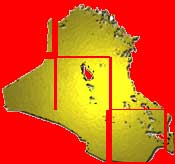Think the Unthinkable: Partition Iraq
 |
It just gets worse and worse for the Bush administration. In the U.S. war on terror, allegations have surfaced that the policies of "torture light" and sexual humiliation of prisoners were widespread around the world and originated from high levels in the administration. Suspicious plea bargaining-normally used to give leniency to lower-level offenders to get their help in implicating higher-level people-has been used with an enlisted interrogator at Abu Ghraib prison in return for his testimony that higher-ups knew nothing of the prison abuse there. The insurgency goes on unabated and has finally begun to cut into the president's poll numbers. The president of the Iraqi Governing Council has been assassinated. Is there a way out of the quagmire for the administration? Yes, but not the one it's banking on.
The administration hopes that a U.N. envoy's selection of an interim government, which will have almost no sovereignty over Iraq upon assuming the helm at the end of June, will fool Iraqis and take the fire out of the insurgency. But given the insurgents' earlier destruction of the U.N. building and killing of the previous U.N. envoy, U.N. credibility in Iraq seems little better than that of the U.S. occupation authority-especially when the United Nations and its selected Iraqi government will be seen by many Iraqis as providing a veneer for continued control by that same authority. So what can the United States do to dampen the insurgency and avoid a potential civil war? Something that the Bush administration and the Washington foreign policy establishment have avoided like the plague: rapid U.S. troop withdrawal and genuine and complete self-determination for Iraqis.
Iraqi self-determination would probably result in the partitioning of Iraq or at least the creation of a loose confederation in which the Kurds, Sunni and Shia would autonomously govern their own affairs. Had the Clinton administration allowed the partitioning of multi-ethnic Bosnia, the United States and other nations would probably not be saddled with the task of keeping the peace in this continuing tinderbox nine years after the Dayton Accords were signed. If the peacekeepers withdrew today, the fighting among Bosnia's ethnic groups would probably resume.
By adopting self-determination for Iraqis, the administration would have to give up its fantasy that the artificial state of Iraq should be whole and democratic in the western sense. Self-determination would deal with the root causes of the insurgency and give the guerrilla groups some incentive to stop fighting and to refrain from causing a civil war.
The Sunni guerrillas are fighting less to bring back Saddam Hussein than repel a foreign invader and prevent paybacks from its elected Shiite government. The Shia, who make up 60 percent of the Iraqi population, have suffered years of oppression under the Sunni minority, and would likely win any Iraq-wide election.
Even the Kurds, currently the most friendly minority group to the United States, may turn surly if they are not allowed to keep at least the autonomy that they have enjoyed for the last 13 years. The American Revolution started when King George attempted to take away traditional English rights from the American colonists. Taking away freedom is always more dangerous than never granting it in the first place. Moktada al-Sadr's Shiite militia is fighting against the foreign invader and to avoid marginalization in any U.S.-backed Shiite government.
If the United States withdrew its forces and each group was allowed to govern itself in its own country or autonomous region, the incentives for violence against the foreign invader and against other Iraqi groups would rapidly decline. The Sunnis would no longer fight the invader or be apprehensive about paybacks from the Shia. The Kurds would keep the autonomy that they have had for more than a decade. Al-Sadr could no longer justify his violence in the name of repelling the crusading invaders and might be forced to negotiate with the revered Ayatollah al-Sistani for a position in any government serving Shia areas.
There are downsides to such an outcome. First, the United States might have to live with governments that do not quite fit the Western democratic model. Second, Turkey would not be happy about the influence that Kurdish autonomy or sovereignty would have on its own restive Kurdish minority. However, Turkey has tolerated de facto Kurdish self determination in northern Iraq for more than a decade. The Iraqi Shia could be co-opted by Shiite Iran or fall victim to internecine warfare that included al-Sadr. Fears of the former, however, have declined as most Iraqi Shia have shown independence from Iran and differing views on the separation of church and state. With the rise of al-Sadr's militia, fears of the latter have increased. But even if intra-Shia conflict erupts after the United States leaves, at least the Shia are practicing some form of self-determination and not shooting at U.S. troops.
Allowing Iraqis rapid and complete self-determination is not a panacea. But this solution does allow the Bush administration the only viable way to declare victory and extricate itself from the Iraqi tar baby, while at the same time offering the Iraqis the best chance to have a peaceful and prosperous future.
Ivan Eland is the Director of the Center on Peace and Liberty at the Independent Institute in Oakland, California and author of the book, Putting "Defense" Back into U.S. Defense Policy: Rethinking U.S. Security in the Post-Cold War World.
Topics: Conflicts And War, United States Of America
Views: 3978
Related Suggestions
Peace to all!
And by the way H.A., don't go spouting off about topics you obviously haven't studied. Texas won its independence from Mexico and then decided to join the US. The war for Texas' independence, which at the time included New Mexico, Arizona, Nevada and California, was caused by disagreements between settlers and the Mexican government. I'm not saying that the US didn't have its interest in Texas but it wasn't a war waged by the United States against Mexico. And lets not forget that at one time Iraq was part of the Ottoman Turk empire. History is cool and I suggest you study it.
See! the illegal possession and occupation of others' property did not start after 9/11.
No wonder the U.S. and the U.K. can't sit quiet. Now the neocons and the zionists have banded with the "civiized" creatures (U.S.ians and Ukians). The thieves/"civilized creatures" are always on the move to live at expense of your resources.
Watch out! They want your land/resources in the name of spreading freedom.
If anyone reading this can't handle H.A.'s "bright" truth, then that's TOO BAD for him or her.
THE END.

















